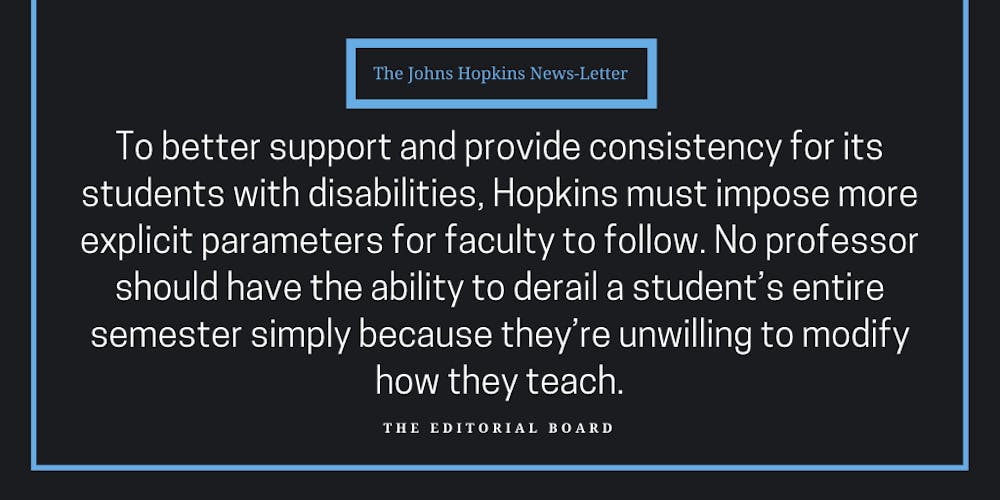If you take the University’s word for it, Hopkins is a beacon of inclusivity. Alongside stunning views of campus, pictures meant to exemplify diversity feature prominently in the University’s promotional materials. This image is too rosy. The environment surrounding disability on campus exemplifies this inconsistency.
The University is responsible for providing students and faculty with disabilities “an inclusive and accommodating environment.” However, students with disabilities have reported many problems when dealing with Student Disability Services (SDS). The office, intended to be a resource for students with disabilities, often falls short of that promise.
One of SDS’s main functions is to authorize and assist with classroom accommodations. SDS defines accommodations as modifications that facilitate equal opportunity for students with disabilities to succeed.
The system for requesting accommodations at Hopkins, Accommodate, is a large source of frustration for students with disabilities. The University’s switch to the system last fall, though intended to streamline accommodations across campuses, forced students to notify professors of their need for accommodations themselves.
Though initial issues with Accommodate have been resolved, the burden still falls on students to ensure they actually receive the support they deserve. The University currently shifts the responsibility to students, expecting that individuals with disabilities will know how to advocate for themselves and what to advocate for.
Students with disabilities are an integral part of our community at Hopkins, and they must be treated as such. Requiring students to contact professors about accommodations makes them vulnerable to having their accommodation needs questioned or shamed. One student even reported a professor yelling at them over the matter.
When students do successfully reach out to their professors, the accommodations they receive vary greatly across courses and departments. Due to the lack of clear guidelines surrounding accommodations, it is up to the individual faculty member to determine which accommodations are “reasonable and necessary.” To better support and provide consistency for its students with disabilities, Hopkins must impose more explicit parameters for faculty to follow. No professor should have the ability to derail a student’s entire semester simply because they’re unwilling to modify how they teach.
Even when a professor does carry out reasonable requests, students receiving necessary accommodations may be alienated: It's obvious to others when only one student is allowed a laptop or iPad in a techless classroom. There’s no denying the competitive academic culture at Hopkins; this can lead students to feel that a peer is receiving “special treatment.” What we all need to recognize, however, is that accommodations for disabilities are not providing an advantage but removing a disadvantage.
Respect and inclusivity are touted as core values of our campus. Offices such as Religious and Spiritual Life, LGBTQ Life, the Office of Multicultural Affairs and Women and Gender Resources explore and promote these themes. The University designates an official space to the promotion and celebration of these identities, and these offices serve an invaluable role in our community. Students with disabilities, however, are excluded from this narrative. SDS serves an administrative role, but it fails to address and influence campus culture surrounding disability. Students with disabilities deserve the same visibility and development.
These problems point to an overarching culture of ableism that is not exclusive to our University. Colleges and universities are not required to track graduation rates specific to students with disabilities. Statistics like these could call attention to mistreatment or lack of accommodations at institutions like Hopkins. Furthermore, they would show students with disabilities that their university community actually cares about their outcomes. By not reporting on or tracking these students during their time in school, the University is sending the message that it doesn’t value improving the experiences of current and future students with disabilities.
The University must take the initiative to promote an environment that serves all students. So long as we are living in a hybrid world, that means remaining cognizant of providing both in-person and online accommodations for students who are likely receiving multimodal instruction. And these accommodations need to actually be accessible; Hopkins must make clear to professors that these services are not optional.





